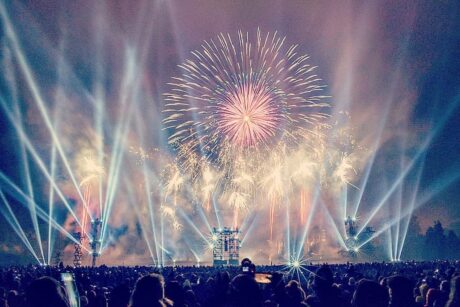
STAFFORDSHIRE, UK – Rehearsals are a performer’s best friend. They’re also a valued ally of lighting designers. But for Olly Suckling, they were a luxury he couldn’t afford when he lit the famed fireworks display at Alton Towers Resort.
More details from Chauvet (www.chamsysusa.com):
“Given the nature of this show, the first time everything is seen working together is on the opening night,” said Suckling. “It simply isn’t possible to have a rehearsal with all the fireworks and other special effects being set off due to the sheer cost of such a large display. This means that the creatives from each department have to work together closely to plan how the show will look, without fully seeing the final product.”
From a lighting designer’s perspective, working on the fireworks show also requires the ability to very quickly update programming and make critical changes. This was something Suckling was able to accomplish quite handily in his 8-universe 156-fixture show, thanks to his ChamSys MagicQ MQ80 console.
“It was tremendously helpful that I was able to fully program offline using a laptop, while still being able to use external time code,” he said. “The ability to build and patch the rig in Capture, and then have all of the data transferred automatically into to my ChamSys show file, was a massive time saver. I also used MagicQ’s time code tracks feature to program repetitive stabs quickly.”
Another thing that Suckling found very helpful was being able to run the full MagicQ software remote on his laptop over wireless. “This made programming changes quick and easy in the field while standing alongside the other creatives,” he said. “The remote app on the iPad was also indispensable for programming positions away from the console over such a large area.”
The lightshow, accompanied by music, supported the 27-minute fireworks display. To keep the show interesting before the pyrotechnics and between different booms and bangs, he used his ChamSys MagicQ MQ80 and a ChamSys MQ500 to run through an ever-changing variety of looks, choosing colors that coordinated with the fireworks themselves. The consoles were run entirely from time code as a main and backup system.
“The lighting contributed to the creation of an atmosphere in support of the show’s storyline,” he said “It also provided some eye candy moments for certain sections between the fireworks. It feels good know it contributed to the enjoyment of so many people.”
Indeed, although the more than 20,000 in attendance each night oohed and aahed at the fireworks, they also got swept up in the immersive lighting that helped define the event at the famous theme park. Few of them, if any, gave thought to how the spectacle they enjoyed came together with a lot of hard work and planning – but no complete rehearsal.


